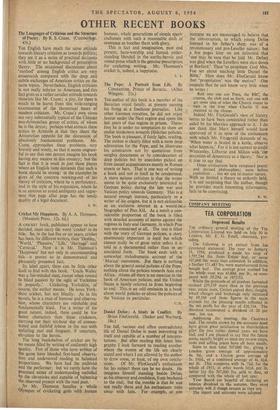THE full, various and often contradictory life of Daniel Defoe
is most interesting in itself and capable of a number of interpre- tations. But after reading this latest bio- graphy I look forward to reading another where the events of the life are clearly stated and where I am allowed by the author to draw some, at least, of my own conclu-
sions. Of Mr. FitzGerald's enthusiasm for his subject there can be no doubt. He imagines himself standing beside Defoe, as his observer and confidant, from boyhood to the end; but the trouble is that he was not really there and his enthusiasm runs away with him. For example, at one
moment we are encouraged to believe that the conversation, to which young Defoe listened in his father's shop, was of a revolutionary and pro-Leveller nature; but a few pages later we are informed that 'one may be sure that he [old Mr. Defoe] was glad when the Levelers were shot down at Burford.' Then `to propitiate God Mrs. Foe set about teaching little Daniel the Bible.' How does Mr. FitzGerald know that 'propitiation' was the motive? One suspects that he can know very little when he writes : Roll into- one our Press, the BBC, the
cinema, the club and so forth, and you will get some idea of what the Church meant to men in the time when Charles II was restored to the throne.
Indeed Mr. FitzGerald's view of history seems to have been constricted rather than aided by his Marxian approach to it. 1 do not think that Marx himself would have approved of it in spite of the enthusiasm with which Mr. Fitzgerald demands of us, 'When water is heated in a kettle, observe what happens.' For it is not correct to credit Winstanley, Lilburne and Milton with 'the invention•of democracy as a theory.' Nor is it true to say that Other •eivilisations have composed poetry
and devised philosophies; none before
capitalism ... has set qut to master nature. With so limited a theory so ardently held, it is not surprising that the author, though he provides much interesting information, fails to be convincing.
R. W.


































 Previous page
Previous page